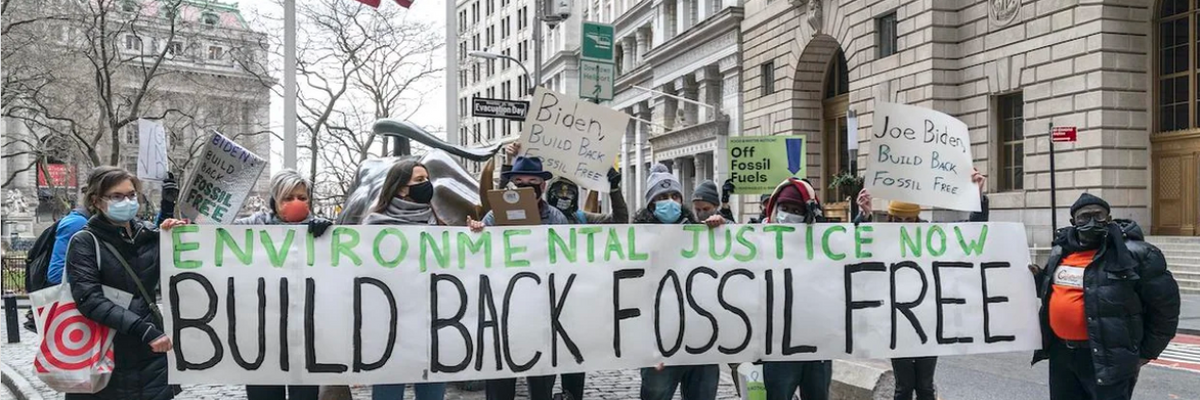Although the strategic phase out of fossil fuels is the logical place to start curbing emissions, 25 years of climate negotiations have failed to mobilize a global effort to limit global fossil fuel production. In a few days, President Biden is hosting a Leaders Summit on Climate where he plans to urge global leaders to ratchet up their climate ambition. But all eyes are on the US and Canada, who are on track to consume two-thirds of the remaining global carbon budget. Canada anticipates producing more oil and gas in 2050 than in 2019.
President Biden and Prime Minister Trudeau must acknowledge and act on a glaring climate policy blind spot that fosters continued oil and gas expansion.
The US is the largest historical contributor to climate change, while Canada has ranked among the top 10 global carbon emitters for over a century. Yet instead of reining in oil and gas production, the US has by far the largest expansion plans for oil and gas in the world: it is on course to produce a staggering 2.3 billion barrels per year (Mbbl/y)--more in 2030 compared to 2019--and over 260 billion cubic meters per year (bcm/y). Canada has the second-largest gas expansion planned for 2030 (78 bcm) and the seventh-largest oil expansion (350Mbbl to 2030)
By refusing to look upstream to fossil fuel extraction and production, international negotiations have mistakenly fixated on mitigating emissions at the site of combustion and consumption. Strikingly, the 31-page Paris Agreement makes no mention of fossil fuels. Undeniably, demand-side measures such as energy efficiency standards and carbon pricing are important. Yet supply-side climate policies--i.e. policies that limit the exploration, extraction or transportation of fossil fuels--have been largely ignored, despite being central to achieving 1.5C climate goals.
President Biden has shown some encouraging signs. Within days of taking office, he revoked the Keystone XL pipeline permit, froze new oil and gas leasing on federal lands and offshore waters, and committed to a review of existing fossil fuel leases. However, the Biden administration recently announced it would allow oil to continue to flow through the Dakota Access Pipeline, despite promises to listen to Tribes and take environmental and climate justice seriously. Less encouragingly, Prime Minister Trudeau has been silent on the issue of curbing fossil fuels, bowing to the pressure of fossil fuel lobbyists--who in 2020 alone, met with Canadian politicians over 1,200 times, an average of 4.5 times per working day. So what must change?
The US and Canada can assert existing federal authority to begin an equitable, managed phase-out of fossil fuel production, one that could provide a blueprint for other fossil fuel producing nations. While both countries are federal states, each government has substantial levers to begin this work.
For the US, passing the End Polluter Welfare Act would eliminate all federal subsidies and financial support for fossil fuel production. Reinstating the crude oil export ban, prohibiting exports of coal and liquified gas, banning fracking on federal lands, and rejecting federal permits for any fossil fuel infrastructure--including the Dakota Access, Line 3, and Mountain Valley Pipelines--would send a powerful signal to global leaders.
Canada can up its climate ambition by removing federal subsidies and public financing for fossil fuel production and infrastructure, prohibiting the leasing of federal lands and waters for fossil fuel activity, and importantly, cancelling the Trans Mountain expansion pipeline.
Biden and Trudeau could also convene National Just Transition Commissions to prioritize a coordinated managed fossil fuel phase out that ensures no fossil fuel workers and communities are left behind. Early retirement plans; redundancy packages, priority job placement, and dedicated funding streams should form central components to any just transition.
The Climate Summit could serve as a platform to begin discussions on "the first-ever global negotiation of the cooperative managed decline of fossil fuel production"--an idea proposed by Vice President Harris in her 2020 presidential run. While it is unrealistic to expect buy-in from fossil fuel-rich nations, a smaller "coalition of the willing" could take the lead on tackling the managed decline of fossil fuels. This could operate akin to the Powering Past Coal Alliance--a group of governments and businesses committed to ending coal burning for power. While several countries are already limiting new permits for fossil fuel infrastructure, including Ireland, New Zealand, France, Denmark, Belize, and Costa Rica, the Climate Summit provides a historic opportunity to begin discussions on curbing fossil fuel production on a global scale.

